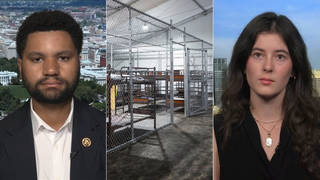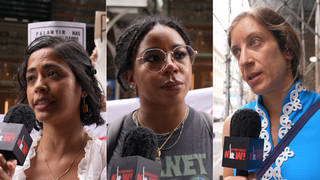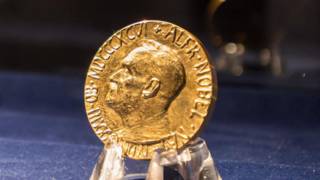
We feature excerpts from activists from Russia, Ukraine and Belarus who were honored Saturday at the 2022 Nobel Peace Prize ceremony in Oslo, a rebuke to Russian President Vladimir Putin, who just days earlier vowed that his war in Ukraine would be a “long process” with no clear end in sight. Jan Rachinsky accepted on behalf of the Russian civil rights group Memorial, which was shuttered by the government last year. Oleksandra Matviichuk accepted the award on behalf of the Center for Civil Liberties in Ukraine, and Natallia Pinchuk attended the ceremony in place of her husband, the jailed Belarusian activist Ales Bialiatski.
Transcript
AMY GOODMAN: The Nobel Peace Prizes were given out Saturday on International Human Rights Day in Oslo, Norway. The awards went to the Ukrainian organization Center for Civil Liberties, the Russian group Memorial and Ales Bialiatski, imprisoned human rights activist in Belarus. The Nobel Peace Prize ceremony came nearly 10 months after Russia invaded Ukraine. On the same day as the Nobel ceremony, Russia launched a drone strike on the Ukrainian port city of Odessa, cutting power to one-and-a-half million people. Millions of Ukrainians face a winter without heat or electricity after Russian strikes on civilian infrastructure.
We begin today’s show airing excerpts of the speeches from Saturday’s Nobel Peace Prize ceremony. This is Oleksandra Matviichuk, the head of the Center for Civil Liberties in Ukraine.
OLEKSANDRA MATVIICHUK: [translated] We are receiving the Nobel Peace Prize during the war started by Russia. This war has been going on for eight years, nine months and 21 days. For millions of people, such words as “shelling,” “torture,” “deportation,” “filtration camps” have become commonplace. But there are no words which can express the pain of a mother who lost her newborn son in a shelling of the maternity ward. A moment ago, she was caressing her baby, calling him by his name, breastfeeding him, inhaling his smell. And the next moment a Russian missile destroyed her entire universe. And now her beloved and her longed-for baby lies in the smallest coffin in the world. …
How can we make human rights meaningful again? …
Peace, progress and human rights are inextricably linked. A state that kills journalists, imprisons activists or disperses peaceful demonstrations poses a threat not only to its citizens. Such a state poses a threat to the entire region and peace in the world as a whole. Therefore, the world must adequately respond to systemic violations. In political decision-making, human rights must be as important as economic benefits or security. This approach should be applied in foreign policy, too.
Russia, that has been consistently destroying its own civil society, illustrates this very well. But the countries of the democratic world have long turned a blind eye to this. They continued to shake hands with the Russian leadership, build gas pipelines and conduct business as usual. For decades, Russian troops have been committing crimes in different countries. But they always got away with this. The world has not even adequately responded to the act of aggression and annexation of Crimea, which were the first such cases in post-war Europe. Russia believed that they could do whatever they want.
Now Russia is deliberately inflicting harm on civilians, aiming to stop our resistance and occupy Ukraine. Russian troops intentionally destroy residential buildings, churches, schools, hospitals, shell evacuation corridors, put people in filtration camps, carry out forced deportations, kidnap, torture and kill people in the occupied territories. The Russian people will be responsible for this disgraceful page of their history and their desire to forcefully restore the former empire. …
People of Ukraine want peace more than anyone else in the world. But peace cannot be reached by country under attack laying down its arms. This would not be peace, but occupation. After the liberation of Bucha, we found a lot of civilians murdered in the streets and courtyards of their homes. These people were unarmed.
We must stop pretending deferred military threats are “political compromises.” The democratic world has grown accustomed to making concessions to dictatorships. And that is why the willingness of the Ukrainian people to resist Russian imperialism is so important. We will not leave people in the occupied territories to be killed and tortured. People’s lives cannot be called “political compromise.” Fighting for peace does not not mean yielding to pressure of the aggressor; it means protecting people from its cruelty.
In this war, we are fighting for freedom in every meaning of the word. And for it, we are paying the highest possible price. We, Ukrainian citizens of all nationalities, should not discuss our right to a sovereign and independent Ukrainian state and development of the Ukrainian language and culture. As human beings, we do not need an approval of our right to determine our own identity and make our own democratic choices. …
This is not a war between two states. It is a war of two systems: authoritarianism and democracy. We are fighting for the opportunity to build a state in which everyone’s rights are protected, authorities are accountable, courts are independent, and the police do not beat peaceful student demonstrations in the central square of the capital. …
We do not want our children to go through wars and suffering. So, as parents, we have to assume the responsibility and act, not to shift it on our children. Humanity has a chance to overcome global crises and build a new philosophy of life.
It’s time to assume the responsibility. We don’t know how much of the time we still have.
And since this Nobel Peace Prize ceremony takes place during the war, I will allow myself to reach out to people around the world and call for solidarity. You don’t have to be Ukrainians to support Ukraine. It is enough just to be humans.
AMY GOODMAN: That was Oleksandra Matviichuk, the head of the Center for Civil Liberties in Ukraine, which received the Nobel Peace Prize on Saturday.
The Russian human rights group Memorial also won the Nobel Peace Prize. This is the Russian human rights activist Jan Rachinsky of Memorial.
JAN RACHINSKY: [translated] Memorial’s human rights defense work has included the search for the missing, investigation of extrajudicial executions and reporting on forced disappearances. It has included years of help for refugees and the forcibly displaced due to these conflicts. Memorial has been carrying out the monitoring of political repression and legal assistance for political prisoners. Today, the number of political prisoners in Russia is more than the total number in all of the Soviet Union at the beginning of the period of the perestroika in the 1980s. The struggle for freedom has continued since the Soviet regime. Here, the past and the present come together. …
In the Soviet empire, any attempts by peoples to fight for national independence or even simply manifest a national consciousness that did not fit the Soviet ideological dogma were declared to be “bourgeois nationalism” and were brutally suppressed. After the collapse of the USSR, the states that formed on this territory had their own historical narratives that did not coincide with the official Soviet historical mythology. And soon after Vladimir Putin came to power, the new Russian leadership and his ideological servants began violent and aggressive “memory wars” against their neighbors — Estonia, Latvia, Ukraine — while fully using old Soviet stereotypes and labels. Of course, this was done for the sake not of “historical truth,” but for their own political interests. The result was that the Russian propaganda against “nationalism” — and what Putin’s regime called “Bandera-ism,” after a far right-wing Ukrainian nationalist — became the ideological justification for the insane and criminal war of aggression against Ukraine.
One of the first victims of this madness was the historical memory of Russia itself. Indeed, in order to pass off aggression against a neighboring country as “fighting fascism,” it was necessary to twist the minds of Russian citizens by swapping the concepts of “fascism” and “anti-fascism.” Now the Russian mass media refer to the unprovoked armed invasion of a neighboring country, the annexation of territories, terror against civilians in the occupied areas and war crimes as justified by the need to fight fascism.
Hatred is incited against Ukraine, its culture and language are publicly declared “inferior,” and the Ukrainian people are deemed not to have a separate identity from Russians. Resistance to Russia is called “fascism.” Such propaganda absolutely contradicts the historical experience of Russia and devalues and distorts the memory of the truly anti-fascist war of 1941 to 1945 and the Soviet soldiers who fought against Hitler. The words “Russian soldier” in the minds of many people will now be associated not with those who fought against Hitler, but with those who sow death and destruction on Ukrainian soil.
AMY GOODMAN: That was Jan Rachinsky of the Russian human rights group Memorial, one of the three recipients of the Nobel Peace Prize this year.
The third winner was Ales Bialiatski, a human rights activist imprisoned in Belarus. He was detained there after the 2020 protests against the reelection of President Alexander Lukashenko. Bialiatski remains in jail without trial and faces up to 12 years if convicted. At the Nobel award ceremony in Oslo Saturday, his wife Natallia Pinchuk delivered the speech on behalf of her imprisoned husband.
NATALLIA PINCHUK: [translated] I want to express my profound gratitude to the Norwegian Nobel Committee, whose decision strengthened Ales in his commitment to stand firm in his convictions and gives hope to all Belarusians that they can count on the democratic world’s solidarity in the fight for their rights, no matter the length of struggle. …
Not only is Ales in prison, but there are also thousands of Belarusians, tens of thousands of repressed, unjustly imprisoned for their civic action and beliefs across the country. Hundreds of thousands have been forced to flee the country for the mere reason that they wanted to live in a democratic state. Unfortunately, the war of the authorities against their own people, language, history and democratic values has been waged in Belarus for years. I say this here with supreme pain and vigilance, as today’s political and military events threaten Belarus with the loss of statehood and independence.
Unfortunately, the authorities choose to engage with society through the use of force — grenades, batons, stun guns, endless arrests and torture. There is no effort or talk about national compromise or dialogue. They persecute girls and boys, women and men, minors and elderly people. The inhuman face of system reigns in Belarusian prisons, especially for those who dreamed of being free people.
In light of such a situation, it is no coincidence that the authorities arrested Ales and his associates from the human rights center Viasna for their democratic beliefs and human rights activities: Marfa Rabkova, Valiantsin Stefanovic, Uladzimir Labkovich, Leanid Sudalenka, Andrei Chapiuk and other human rights defenders are behind bars. …
Ales could not convey the text of his speech from prison, but he managed to tell me just a couple of words. Therefore, I will share with you his thoughts, both the latest and those recorded earlier. These are fragments of his previous statements, writings and reflections. Here are his reflections about the past and future of Belarus, about human rights, about the fate of peace and freedom. So, I pass the floor to Ales. …
In my homeland, the entirety of Belarus is in a prison. Journalists, political scientists, trade union leaders are in jail. There are many of my acquaintances and friends among them. … The courts work like a conveyor belt, convicts are transported to penal colonies, and new waves of political prisoners take their place.
This award belongs to all my human rights defender friends, all civic activists, tens of thousands of Belarusians who have gone through beatings, torture, arrests, prison.
This award belongs to millions of Belarusian citizens who stood up and took action in the streets and online to defend their civil rights. It highlights the dramatic situation and struggle for human rights in this country.
I recently had a short dialogue. “When will you be released?” they asked me. “I am already free, in my soul,” was my reply.
AMY GOODMAN: That’s Natallia Pinchuk, wife of imprisoned Belarusian human rights activist Ales Bialiatski, delivering her husband’s Nobel Peace Prize speech in Oslo on Saturday, December 10th, International Human Rights Day.
Next up, Lowndes County and the Road to Black Power. A new documentary looks at the pivotal role one county in Alabama played in the Black Power movement. Stay with us.













Media Options